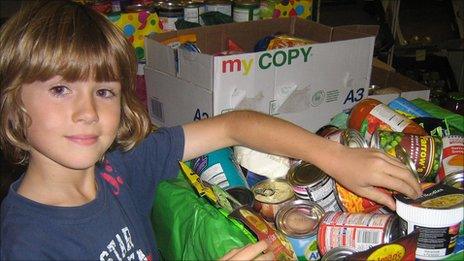Hidden hunger fuels increase in foodbanks in Wales
- Published

Vouchers are exchanged for food at the UK National Foodbank Network centres
The number of foodbanks in Wales is set to increase substantially this year due to growing demand.
The UK National Foodbank Network has 11 centres in Wales but is set to expand to 18 this year.
One centre in Ebbw Vale, Blaenau Gwent, said it has seen an increase in clients on low incomes - and not only benefit recipients - in recent years.
Oxfam Cymru said "a few thousand" families in Wales receive the aid and warn the situation could worsen.
Food is donated by individuals, schools, businesses and churches, and is given to those in need.
Director Adrian Curtis said: "It's not just people who are on benefits who are unable to put food on the table."
"We have had an increase in the number of clients we see who are working but are on low incomes, they make up around 4 - 5%.
"The number of clients who are benefit claimants has increased from around 40% two years ago to almost 50% today.
"The increasing number of foodbanks in Wales reflects this growing need, as well as the fact that more people are finding out about us."
The UK National Foodbank Network is run by Christian charity Trussell Trust. It opened its first in Wales in Ebbw Vale two years ago and the eleventh in Carmarthen last week.
"There will always be a need. Inflation, pay freezes, rising fuel prices - basically the current economic climate means that some of the poorest members of society are going to be the hardest hit," said Mr Curtis.
"Someone on a low income who sees a drop of just a tenner a week in their take home pay - well, this can be the difference between whether they eat or not.
"And for those on benefits, a change in circumstances can lead to their claim being reassessed and while this takes place they may receive no money at all what was a manageable situation becomes a crisis and they need our help."
People are referred to the foodbank from organisations as diverse as schools, GP's, Citizens' Advice and social services who issue vouchers to clients in need.
The vouchers can then be exchanged for three days' worth of food.
"Some people might say it is for government to ensure that people are fed, not the charity or voluntary sector," said Mr Curtis.
"But we have to be realistic - government services are not always going to meet the immediate needs of people. There will always be there who fall through the safety net.
"If we can help out in a practical sense with food while they get back on their feet then that has got to be better than doing nothing."
Ian Purcell, director of Cardiff Foodbank, said the centre had had helped more than 1,000 since it opened last May.
Oxfam Cymru help fund the Ebbw Vale foodbank, and Chris Johnes, head of the charity in Wales, said: "This is a growing crisis going rather unnoticed over the last few years.
"People do find it surprising that there is a need for foodbanks in Wales.
"Families are faced with choosing between feeding their families or paying the bills.
"Considering the current economic climate and changes to the benefits system, this situation could well get much worse."
- Published28 December 2010
- Published18 December 2010
- Published7 October 2010